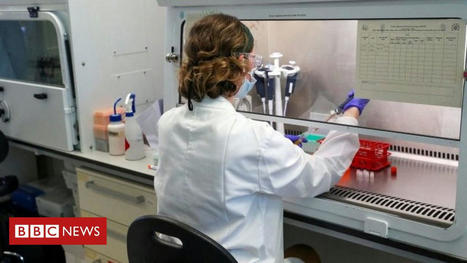It aims to inoculate some 300m people this year in one of the world's largest vaccination campaigns. The drugs regulatory authority gave the green light to the jabs developed by AstraZeneca with Oxford University and by local firm Bharat Biotech. Prime Minister Narendra Modi called it "a decisive turning point". India plans to inoculate some 300 million people on a priority list this year. It has recorded the second-highest number of infections in the world, with more than 10.3 million confirmed cases to date. Nearly 150,000 people have died. On Saturday India held nationwide drills to prepare more than 90,000 health care workers to administer vaccines across the country, which has a population of 1.3 billion people. The Drugs Controller General of India said both manufacturers had submitted data showing their vaccines were safe to use. However, opposition politicians and some doctors have criticised a lack of transparency in the approval process.
Dr Swapneil Parikh, an infectious diseases researcher based in Mumbai, told the BBC doctors were in a difficult position. "I understand there is a need to go through the process quickly, remove regulatory hurdles," he said. "However... [governments and regulators] have a duty to be transparent about the data they have reviewed and the process involved in making the decision to authorise a vaccine, because if they don't do this, it can affect the public's faith in the process." The Oxford/AstraZeneca vaccine is being manufactured locally by the Serum Institute of India, the world's largest vaccine manufacturer. It says it is producing more than 50 million doses a month. Adar Poonawalla, the company's CEO, told the BBC in November that he aimed to ramp up production to 100 million doses a month after receiving regulatory approval. The jab, which is known as Covishield in India, is administered in two doses given between four and 12 weeks apart. It can be safely stored at temperatures of 2C to 8C, about the same as a domestic fridge, and can be delivered in existing health care settings such as doctors' surgeries. This makes it easier to distribute than some of the other vaccines. The jab developed by Pfizer/BioNTech - which is currently being administered in several countries - must be stored at -70C and can only be moved a limited number of times - a particular challenge in India, where summer temperatures can reach 50C.
The local vaccine, however, was approved despite the absence of data on how efficient it can be. It has yet to go through large-scale trials. The Drugs Controller General, V.G. Somani, said Bharat Biotech's Covaxin was "safe and provides a robust immune response". Mr Somani said it had been approved "in public interest as an abundant precaution, in clinical trial mode, to have more options for vaccinations, especially in case of infection by mutant strains". India, which makes about 60% of vaccines globally, plans to immunise about 300 million people by July 2021. It will prioritise health care workers, the emergency services, and those who are clinically vulnerable because of age or pre-existing conditions. India's existing vaccination programme already reaches about 55 million people a year, administering 390 million free jabs against a dozen diseases. It stocks and tracks the vaccines through a well-oiled electronic system.



 Your new post is loading...
Your new post is loading...









